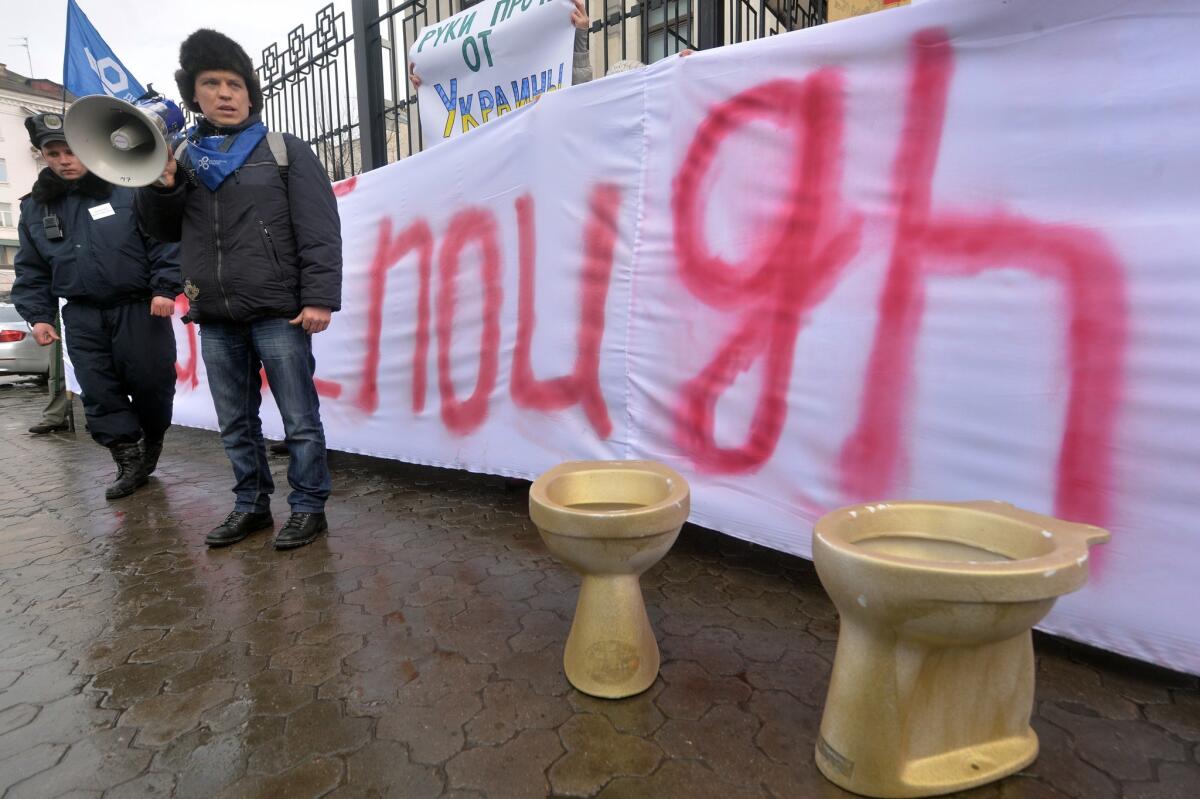How do countries rank on corruption?

- Share via
From war-ravaged backwaters to the world’s economic powerhouses, little progress was recorded over the last year in the fight against bribe-takers and backroom dealers, Transparency International reported in its annual corruption survey.
More than two-thirds of the 175 countries and territories included in the Corruption Perceptions Index for 2014 scored below 50 on a 100-point scale. Just two, Denmark and New Zealand, ranked in the top 10 percentiles with scores of 92 and 91, respectively. North Korea and Somalia tied for last place with 8.
The United States came in 17th place with a score of 74, a slight improvement over last year that put the country on the same level as Ireland, Hong Kong and Barbados.
The results of such pervasive corruption are tangible, said the Berlin-based watchdog: poorly equipped schools, counterfeit medicine, bought elections.
In one example cited by the group, Iraqi Prime Minister Haider Abadi recently divulged that 50,000 “ghost soldiers” were on the military’s payroll — the equivalent of four divisions whose paychecks went to senior officers. Such rampant corruption contributed to the failure of a force, which was built with $25 billion in U.S. aid, to counter the territorial grab by Islamic State extremists this year.
The index measures perceived levels of public sector corruption, drawing on surveys and assessments collected from independent institutions specializing in governance and business climate analyses.
As in last year, the European Union and Western European states had the best results, with just 16% of countries scoring below 50 points, compared with 95% in Eastern Europe and Central Asia and 92% in sub-Saharan Africa.
Turkey recorded the biggest setback, dropping 5 points to score 45 in the wake of a string of sensational corruption allegations, including incriminating tapes in which President Recep Tayyip Erdogan appeared to be ordering his son Bilal to “make vanish” tens of millions of dollars in cash stashed at a family residence.
“This has all taken the shine off Turkey, with its nearly double-digit growth rate now suffering a similar decline to its Corruption Perceptions Index score,” wrote Anne Koch, the group’s regional director for Europe and Central Asia.
Angola, China, Malawi and Rwanda also saw their scores fall by 4 points apiece.
China’s dramatic slide — it fell 20 places from the previous year to 100th place with a score of 36 — came despite a high-profile drive by President Xi Jinping to root out corrupt officials, both high-ranking “tigers” and lowly “flies.”
The country has vowed to track down those who hide ill-gotten gains overseas, and dropped its opposition to anti-corruption measures recommended by the Group of 20 major economies at a summit last month. Yet China’s poor showing in this year’s index raises the question: “How effective is a top-down approach when you don’t have transparency, accountable government and free media and civil society?” wrote Srirak Plipat, Transparency International’s director for the Asia Pacific region.
Plipat noted that “recent prosecutions in China are largely seen as efforts to clamp down on political opponents of the regime, as opposed to genuine anti-corruption commitments.”
The Asia Pacific region includes some of the world’s fastest-growing economies, but 18 of the 28 countries included in the index scored less than 40 this year. India, the Philippines and Thailand all scored 38 and Indonesia came in at 34.
Corruption also has been a problem for other emerging markets, including Brazil (with a score of 43), where officials are accused of siphoning billions of dollars from the state-run oil company Petrobras into the coffers of political parties; and Mexico (35), where the disappearance of 43 students called attention to the infiltration of local governments and police forces by organized crime.
“Grand corruption in big economies not only blocks basic human rights for the poorest but also creates governance problems and instability,” said Jose Ugaz, chairman of Transparency International. “Fast-growing economies whose governments refuse to be transparent and tolerate corruption create a culture of impunity in which corruption thrives.”
In Ukraine, the reckless corruption that marked President Viktor Yanukovich’s rule contributed to his downfall early this year and left the country’s army ill-equipped to counter Russia’s invasion of Crimea.
“It’s easy to blame individual corrupt figures, but Yanukovich’s massive money laundering was only possible with the help of willing Western banks and middlemen, something EU governments have failed to tackle,” Koch said.
The anti-corruption group is urging the European Union, United States and G-20 countries to follow Denmark’s lead and create public registers that would identify who really controls or is the beneficial owner of all companies incorporated in their territories. Britain and Ukraine have announced similar measures.
For more international news, follow @alexzavis on Twitter
More to Read
Sign up for Essential California
The most important California stories and recommendations in your inbox every morning.
You may occasionally receive promotional content from the Los Angeles Times.











